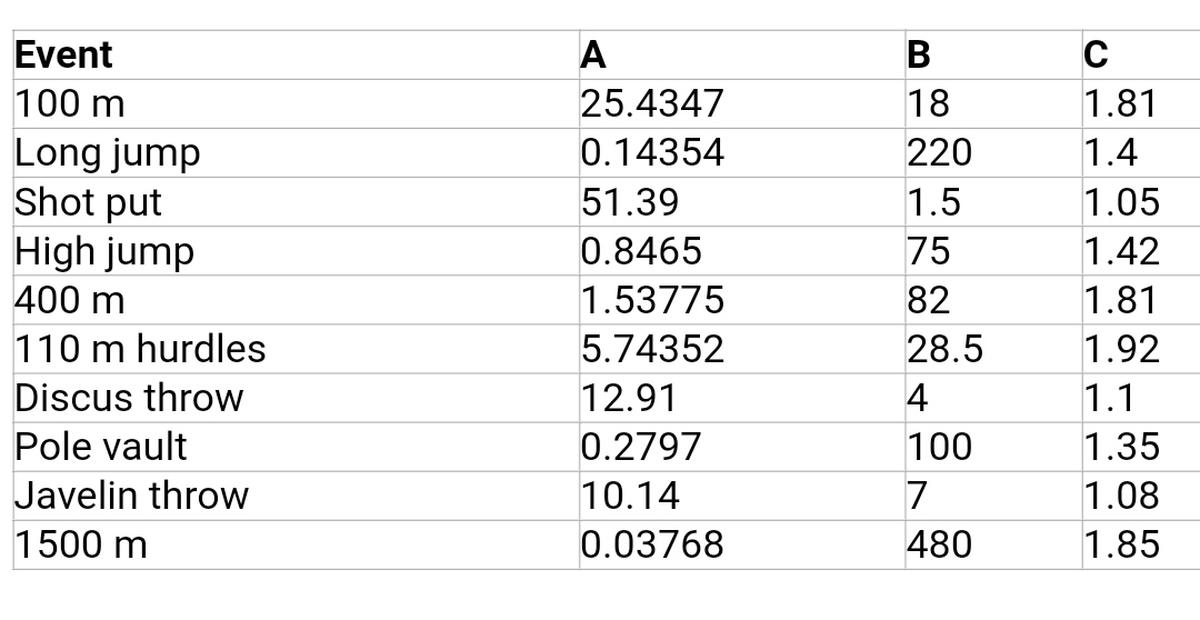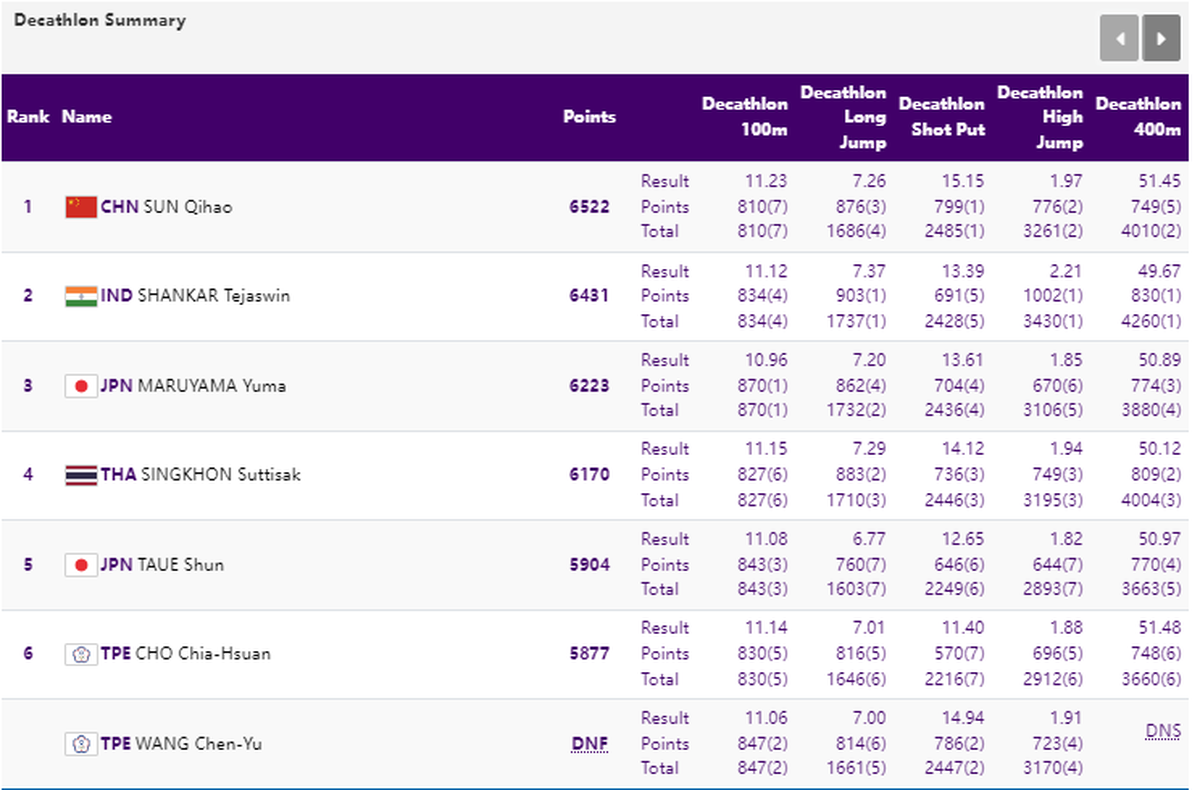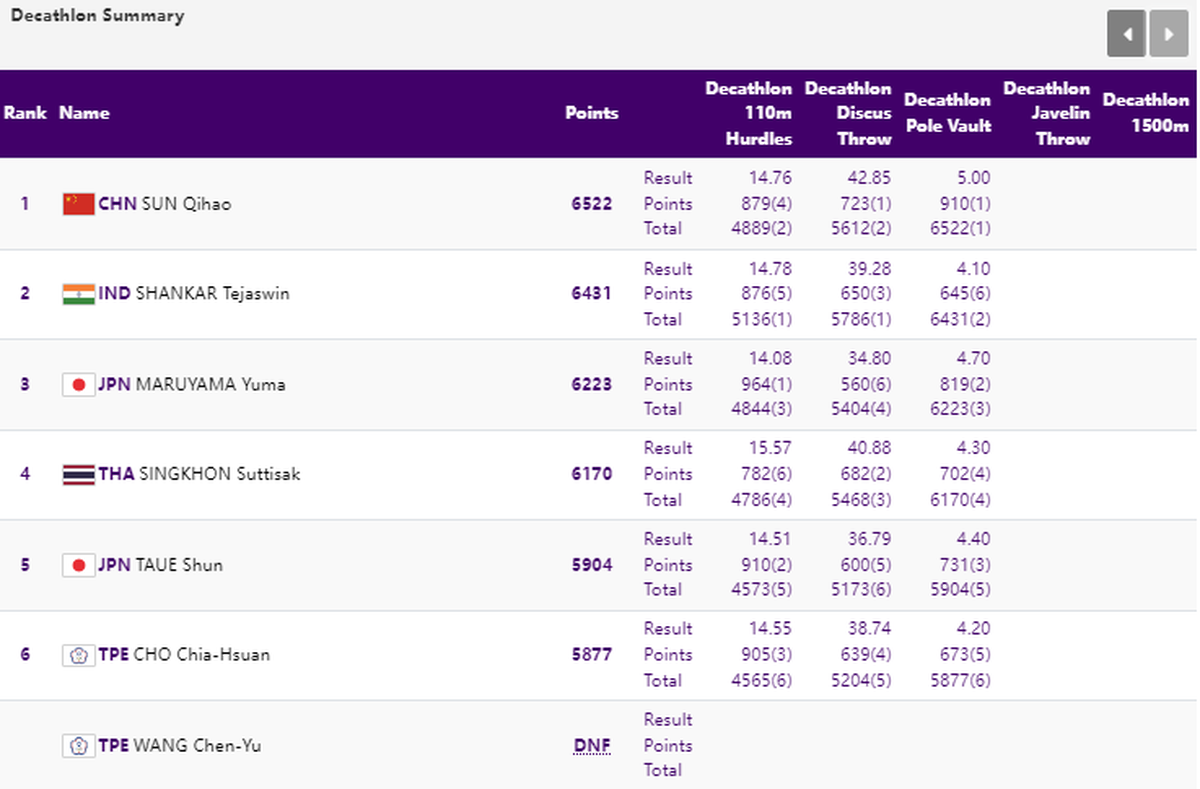At the end of eight events in the men’s decathlon at the Asian Games, Tejaswin Shankar is on 6431 points, 91 points behind China’s Sun Qihao who is in gold medal position with 6522 points. Japan’s reigning Asian champion Yuma Maruyama is at 6223 points, 208 points behind the Indian, who took bronze at the Asian Championships in Bangkok, and is unlikely to make up the numbers at this point having already completed his strongest events.
As such, it’s a fight for gold between Tejaswin Shankar and the host country’s Sun Qihao. While Tejaswin’s personal best of 7648 is some ways behind Qihao’s 7852, the Asian Games decathlon event looks to be heading to a lot closer finish.
FOLLOW LIVE – ASIAN GAMES UPDATES October 3
At this point two events remain in the two day competition – the javelin throw and the 1500m. Qihao is expected to increase this lead further in the javelin throw.
Qihao has a season’s best of 58.98m and a personal best of 63.51m in the javelin. Qihao has had a solid but not spectacular performance so far at the Asian Games – performing around his season’s best in the individual events so far. As such he might be expected to throw in the 59m range in the javelin event as well. That would add around 721 points to his total.
Tejaswin on the other hand wouldn’t count the javelin amongst his strongest events. He has a personal best of 52.70m at the Asian Champions in July this year. A throw in that range would net him 629 points.
That means with just the 1500m to go, Qihao would extend his lead to about 183 points. However all is not lost for Tejaswin at this point. Although no athlete really trains for the 1500m the 24-year-old is a decent runner over the distance. He has a season’s best of 4.36.10 which is good for 705 points. Qihao despite the lead built up until the final event, is a poor 1500m runner, since he is more of a pole vault specialist. The Chinese has a season’s best of 4.55.54 that’s only good for about 586 points – 119 points behind Tejaswin.

China’s Sun Qihao reacts during the men’s decathlon pole vault at the 19th Asian Games in Hangzhou.
| Photo Credit:
AP
China’s Sun Qihao reacts during the men’s decathlon pole vault at the 19th Asian Games in Hangzhou.
| Photo Credit:
AP
This means that should the two athletes perform to the standard they have maintained throughout the season and competition, Tejaswin would finish about 64 points behind the Chinese. However the fact is that Tejaswin has been having an above average competition in Huangzhou. Still only in his second year competing in the decathlon, he’s set new personal bests in three events shot put (13.39m) pole vault (4.10m) and discus throw (39.28m). Should he make another personal best in the javelin – he’s spoken earlier of targetting 55m, would make his job a lot easier in the 1500m.
Should Tejaswin throw in the 55m range, he would score 663 points, giving Qihao an overall lead of 149 points. Then, even should the Chinese run at or close to his personal best, Tejaswin would have to run a sub 4.32 second race. While shaving four seconds off his personal best isn’t easy, the fact is that Tejaswin, has never a clear target in front of him so far in any of the decathlon’s he’s competed in.
As things stand, Tejaswin is more than on track to break Bharatinder Singh’s 12-year-old National record of 7658 points. Indeed he is likely to cross that mark by around a hundred points. But with the end of the decathlon in sight, the Indian would be propelled further by seeing Qihao within striking distance. It needs a few permutations, but should the stars align just right, with the Chinese having a slightly less than par finish, Tejaswin might just end up with a golden Asian Games moment of his own.
How are points calculated in Decathlon?
Points for individual events in the decathlon are calculated by a points-scoring formula determined by the IAAF. The points are awarded (decimals are rounded to the nearest whole number to avoid fractional points) in each track event. The formula is different for Track and Field events since a faster time will be smaller number and a better throw, jump will be a larger number.
Accordingly, the formula points in track events where timing is measured in seconds by a time (T) are calculated as follows:
Points scored =A×(B−T) raised to C
For the jumps and throws -measured by a distance (D) – the points formula for each event is as follows.:
Points =A×(D−B) raised to C

A, B and C are fixed numbers specifically chosen for each event. The quantity B gives the cut-off time above which you will score zero points. For jumps and throws B is the cut-off distance below which you score zero points. The three numbers A, B and C are chosen differently for each of the ten events. The points achieved for each of the 10 events are then added together to give the total score.

Decathlon Points Breakdown











![Best Weight Loss Supplements [2022-23] New Reports!](https://technologytangle.com/wp-content/uploads/2022/12/p1-1170962-1670840878.png)




